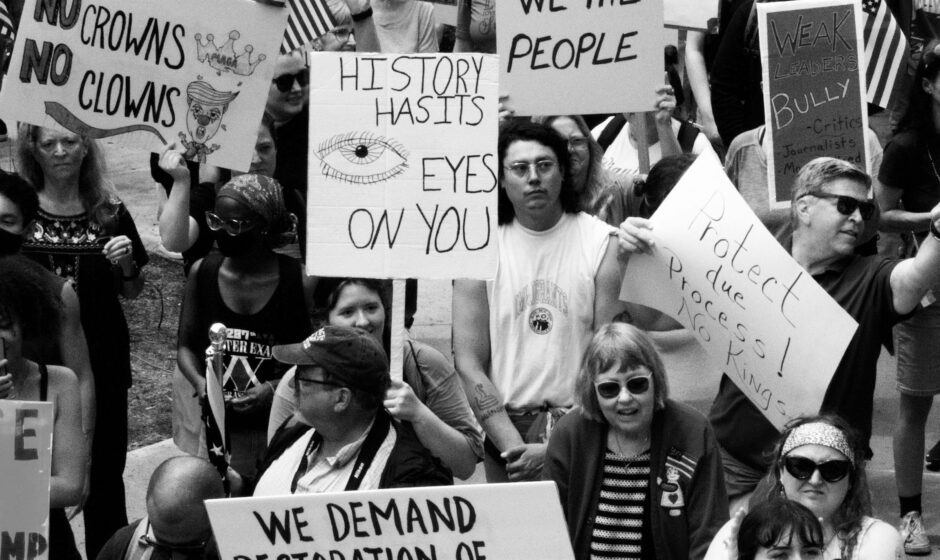Galactday: 55589.3
In the modern era, where information travels in seconds and public opinion shifts rapidly, authoritarian despots are increasingly leaning on an age-old tactic to maintain control: shaping a reality of their own making. This carefully curated reality often stands in stark contrast to the lived experiences of those who must navigate the policies based on cruelty, hardships and consequences of authoritarian rule. Photo by Mariya B
This approach, while not new, has reached unprecedented levels of sophistication. With state-run media, tightly controlled social platforms and relentless propaganda machines, dictating what TV programs are “state-approved”, these dictator’s manufacture a version of events in which they are infallible, their policies flawless, they alone can fix it all and dissenters are nothing more than enemies of progress. It is a reality that exists only for those in power, and yet it is enforced so heavily that questioning it can bring real punishment.
The essence of authoritarian control lies in shaping narratives so completely that truth itself becomes malleable. Changing information is treated as synonymous with changing reality. Economic troubles? Official data can be “revised” by firing the messenger. Public protests? They can be labeled as foreign sabotage. A devastating tariff policy failure —recast it as a brilliant move toward prosperity.
For those living under such regimes, the disconnect between this state-approved reality and daily existence is jarring. Families who can no longer afford food or medicine are told that the economy is thriving. Citizens whose freedoms are stripped away are told they are freer than ever. Those who demand transparency are accused of conspiring against the country’s interests. The narrative is so deeply embedded into the official machinery that the truth feels increasingly out of reach.
The consequences of this approach are more than political. When reality itself is rewritten, the ability for societies to solve real problems is eroded. Take infrastructure failures, for example. In some nations where bridges collapse or public services crumble, admitting such failings would mean acknowledging poor governance. Instead, officials may declare sabotage, foreign interference or even deny the incident entirely, leaving citizens without solutions and often in danger. Its a manufactured world where nothing wears out and everything lasts forever in perfect condition. And reporting the contrary will get you imprisoned or fired.
History is full of examples where authoritarian denial of reality led to disasters that could have been avoided. The Soviet Union’s Chernobyl nuclear catastrophe was worsened by delays in acknowledging the explosion, as officials initially refused to report the scope of the accident. In China’s Great Leap Forward, inflated production numbers and fabricated successes led to famine and millions of deaths, because leaders preferred reports that matched their vision, not the facts. In the United States, a presidential candidate incited an insurrection based on a “Big Lie” when he lost a democratic election.
The same dynamic exists in modern times. Citizens may be told unemployment is low when entire sectors of the economy have collapsed. When people stop filing claims doesn’t mean they’ve gained employment. It may also mean that they exhausted their benefits, stop getting counted and it artificially deflates the unemployment number.
They are informed that public health is strong while hospitals lack basic supplies. Environmental issues may be dismissed as fabricated, even as pollution causes severe health crises. The leadership’s alternative reality might create the illusion of control, but it cannot mask actual suffering. A president may suggest injecting bleach to stop an epidemic, misleading the general public and causing thousands of deaths because addressing the issue would mean listening to competent people.
Technology has made this spin both easier and more fragile. Social media allows authoritarian regimes to flood the public with controlled messaging faster than ever before. But it also gives ordinary people the ability to share firsthand evidence of what is really happening. From smartphone videos of protests to whistleblower leaks, cracks in the carefully maintained narrative are harder to patch over. Americans’ enjoy our freedom to criticize our leaders, so much so as fighting two world wars against tyranny & fascism. American’s would never abandon or undermine our right to choose our leaders, no matter how weak a president occupies our White House.
Still, the imbalance of power remains vast. In many places, journalists face imprisonment or worse for exposing uncomfortable truths. Access to independent information is blocked, and state media dominates the airwaves. For citizens, distinguishing truth from falsehood becomes an exhausting and risky endeavor. This is how leaders lose credibility and their ability to govern is always under suspicion by the governed.
What is perhaps most dangerous about authoritarian reality-spinning is how it erodes collective trust. When citizens are constantly told not to believe what they see with their own eyes, social cohesion fractures. Communities begin to question one another, suspecting neighbors of being informants or agitators. The isolation weakens civil society and strengthens the grip of those in power.
For the people who live under such systems, the path forward is difficult but not impossible. History also provides examples of how truth eventually breaks through. Authoritarian regimes often collapse when their constructed realities become too absurd to sustain. When promises of prosperity are met with empty shelves & high prices, when claims of stability collide with mass protests, national labor strikes & open civil disobedience is when narratives crumble under undeniable evidence, change becomes inevitable and despots flee.
The challenge for those outside such nations is to remember that not all realities are equal. Falsehoods may be repeated loudly and often, but they do not become fact simply by decree. Supporting independent journalism, amplifying the voices of those who expose the truth and refusing to accept propaganda at face value are small but powerful acts that undermine authoritarian spin. We the People are stronger together.
Authoritarians may try to live in their own version of reality, but the people under them do not have that luxury. They endure the policies, see the benefits go straight to the wealthy & well connected, feel the shortages and suffer the consequences of decisions made far above their heads. No amount of narrative control can hide that fact forever.




